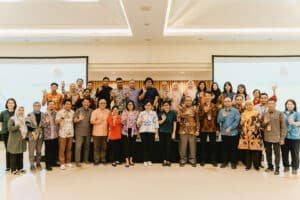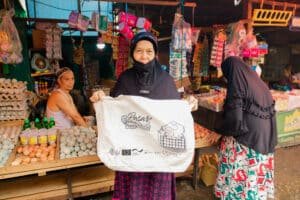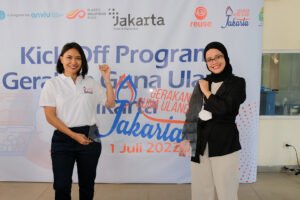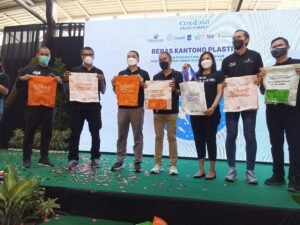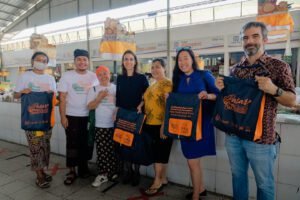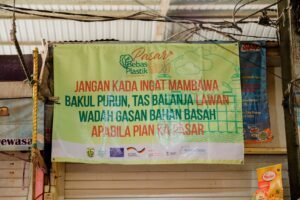Jakarta, 11 May 2022. The Indonesian Plastic Bag Diet Movement (GIDKP) collaborated with Enviu to initiate a program that encourages a reuse lifestyle titled “Jakarta Reuse Movement.” This program will be implemented by involving various community groups and business groups to reduce plastic waste in DKI Jakarta.
One of the waste reduction targets targeted in this program is single-use plastic waste from online food and drink orders. According to research results from the Indonesian Institute of Sciences (LIPI), at the beginning of 2020, there was an increase in the amount of single-use plastic used from online shopping transactions by 47% from ready-to-eat food delivery services through food and drink delivery services.
Director of the Indonesian Plastic Bag Diet Movement, Tiza Mafira, said that currently the government has issued a regulation limiting single-use plastics targeting producers through the Minister of Environment and Forestry (LHK) Regulation No. 75 of 2019 concerning the Roadmap for Waste Reduction by Producers. However, during the COVID-19 pandemic, hygiene reasons for using reusable items in everyday life are still a polemic in society. Finally, the use of all kinds of disposable items is increasing again.
“The Jakarta Reuse Movement was initiated to answer people’s concerns regarding alternative solutions for single-use goods. Apart from that, the hygienic issue of using reusable goods, which are a solution to replace single-use plastic for food and drink containers, including those ordered online, can be accommodated through this movement. We want to prove that using reusable items in everyday life is very possible. “Don’t let the alternative to single-use plastic be single-use items, which in the end still have the potential to generate waste,” said Tiza.
Regarding hygiene, Tiza added, the Jakarta Reuse Movement program also wants to show that items used or borrowed from services that provide reuse facilities can be guaranteed to be washed and sterilized where they have been prepared. So we don’t need to worry anymore. The system is the same as when people eat directly at a restaurant; after we eat, the cutlery we have used will be washed and used again for the next customer. This has been a habit of society for a long time and can be applied in a reuse system for ordering food online.
Rita Ningsih, Head of the Waste Management Section of the DKI Jakarta Provincial Environmental Service, expressed her appreciation for this program initiative, which supports government collaboration with all stakeholders.
“Currently, we in DKI Jakarta Province do not have a direct policy from the government that requires food and beverage service providers to provide a reuse system for take away or online delivery. However, we refer to DKI Governor Regulation No. 142/2019 concerning the obligation to use environmentally friendly shopping bags. We also want to develop these regulations so that plastic bags are not the only ones prohibited in DKI Jakarta Province. Therefore, we prioritize collaboration that can support each other between the government, civil society, and the business industry in Jakarta. Hopefully, “The Jakarta Reuse Movement is a good start to reduce plastic waste, especially food and drink packaging.”
Jakarta Reuse Movement Strengthens Education and Socialization
As the initial series of the Jakarta Reuse Movement, GIDKP held “Training and Discussion on Reusable Packaging in the Food & Drinks,” which aims to gain further understanding regarding reuse models and alternative reuse containers that can be used by business actors, especially food and beverage services, as well as the benefits obtained from implementing these models. The reuse model used for ordering food and drinks online uses ALLAS, a provider of reuse packaging services for food and beverages.
In this activity, GIDKP invited several restaurants and community groups in Jakarta to adopt reuse models in daily food and drink sales. Participants in this activity received exposure to the advantages and challenges of using reusable containers and direct experience in implementing this reuse model.
The hope is that the Jakarta Reuse Movement will become a massive movement and pilot program to be implemented throughout Indonesia to reduce single-use plastic waste further.
This program is also a Pilot Project under the Collaborative Actions for Single Use Plastic Prevention in Southeast Asia (CAP SEA) Project implemented by GIZ. The CAP SEA project is funded by the German Federal Ministry for the Environment, Nature Conservation, Nuclear Safety, and Consumer Protection (BMUV). It is part of a global project to support the Export Initiative for Green Technologies.








